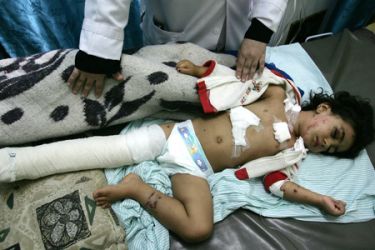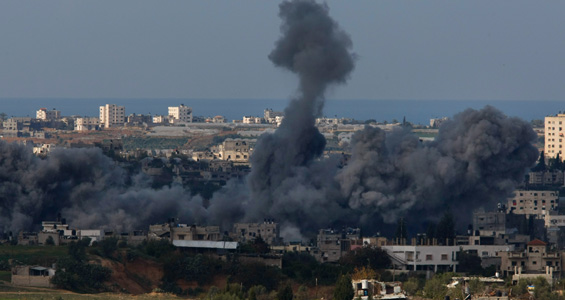January 1: ‘Who will teach me now?’
Nine-year-old Osama Shabat lost his older brother to an Israeli missile.

 |
| Beit Hanoun, North Gaza is hammered by Israeli bombs during operation Cast Lead [GALLO/GETTY] |
For each day of Israel’s war on Gaza, the Al Mezan Center for Human Rights reports on how one family is coping with the war’s aftermath.
In its sixth report from the Gaza Strip, Al Mezan talks to a family whose 24-year-old son was killed by an Israeli missile.
On January 1, 2009, an Israeli aircraft fired a missile into a group of people as worshippers were leaving a nearby mosque in the Beit Hanoun area of northern Gaza.
Fifteen people, including five children, were injured. Osama Shabat was injured and his 24-yearold brother, Fadi, was killed.
Al Mezan spoke to Osama, his mother, Amal, and uncle, Samir.
Screaming and crying
| 23 DAYS, 23 STORIES | |||||||||||
|
Nine-year-old Osama still remembers the details: “I was on my way home from my uncle’s house. I saw a plane in the sky. Then I saw the missile. It came out of the plane. It was red and black. When I got home my back hurt. I didn’t feel anything until I got home.”
His mother, Amal, explains: “He was screaming and crying when he got home. He didn’t know where it hurt. First he was screaming, ‘My back!’ and then ‘My legs!’ I checked him and found he had shrapnel in different parts of his body.
“His father, Nasser, picked him up and ran out into the street to find an ambulance. Then I heard people saying, ‘Fadi is dead, Fadi has been killed’. I didn’t really understand. I was still in shock about Osama.”
When Nasser saw how badly Fadi was injured he put Osama down on the ground. He flagged down a car and took Fadi to Beit Hanoun hospital. They referred him to Shifa hospital where they operated on him for six or seven hours.
“We hoped he would live but he died the next day. When the rocket struck the ground Fadi was so close that he flew in the air and then hit the ground. It was difficult to see how he could have survived,” Amal explains.
“Even though he was badly injured, Osama was discharged after two hours because there was no space in the hospital. But throughout the rest of the offensive we had to take him to hospital every day to get his dressings changed. That was really difficult and dangerous.”
‘Quiet, but funny’
Amal explains that Fadi had hoped to start a career teaching religious studies in that year.
“He had just graduated two months before. We had to borrow money to send him to university. He was quiet, but funny. He used to make us laugh.
“Osama and Fadi were very close, although not in age. Fadi used to teach him and help him with his studies. When we told Osama he’d been killed, he asked straight away, ‘Who is going to teach me now?'”
| in depth | |
|
Fadi’s uncle, Samir, was the last person to speak to Fadi before he died.
“I’d just been with him. I left the site of the attack a few minutes before. Then I heard a rocket and glass breaking. I saw smoke. There was so much smoke.
“I’m a community volunteer and a first-aider so I ran over. I saw a guy with a big build on the ground. He was bleeding. I pressed on the source of the blood, but I felt metal and I was afraid of making the injury worse. Then I looked at his face and realised it was Fadi.”
As part of his community work, Samir has taken training in international law. He hopes there will be justice.
“It’s good that there are investigations and documentation of what is happening. International law has no meaning unless it is upheld. I know that the law says that if you kill there should be punishment. This time the Israelis invaded, so many civilians were killed. So many children. What fault is it of theirs? They were just children.”
Israeli attacks killed more than 1,400 people during Operation Cast Lead, including at least 355 children.
According to the UN Fact Finding Mission on the Gaza Conflict (the Goldstone report), many of these attacks constituted serious violations of international humanitarian law, some of which may amount to war crimes.
Twelve months later, the Israeli judicial system has failed to charge a single person with war crimes.

